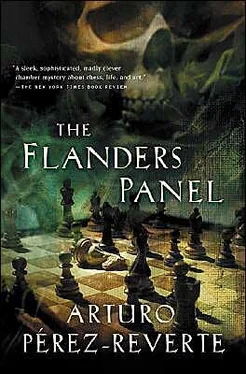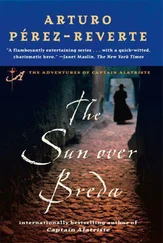He walked her to the university car park and handed her the file containing the photocopies. Almost everything was in there, he said: historical references, an update on the catalogued works of Van Huys, a bibliography… He promised to send a chronological account and a few other papers to her as soon as he had a free moment. He stood looking at her, his pipe in his mouth and his hands in his jacket pockets, as if he still had something to say but was unsure whether or not to do so. He hoped, he added after a short pause, that he’d been of some help.
Julia nodded, feeling perplexed. The details of the story she’d just learned were still whirling round in her head. And there was something else.
“I’m impressed, Professor. In less than an hour you’ve completely reconstructed the lives of the people depicted in a painting you’ve never studied before.”
Alvaro looked away, letting his gaze wander over the campus. Then he made a wry face.
“The painting wasn’t entirely unfamiliar to me,” he said. Julia thought she detected a tremor of doubt in his voice, and it troubled her. She listened extra carefully to his words. “Apart from anything else, there’s a photograph in a 1917 Prado catalogue. The Game of Chess used to be exhibited there. It was on loan for about twenty years, from the turn of the century until 1923, when the heirs asked for it back.”
“I didn’t know that.”
“Well, now you do.” He concentrated on his pipe again, which seemed about to go out. Julia looked at him out of the corner of her eye. She knew him, or, rather, she had known him once, too well not to sense that something important was preying on his mind, something he couldn’t bring himself to say.
“What is it you haven’t told me, Alvaro?”
He didn’t move, just stood there sucking on his pipe, staring into space. Then he turned slowly towards her.
“I don’t know what you mean.”
“I just mean that everything to do with this painting is important.” She looked at him gravely. “I’m staking a lot on this.”
She noticed that Alvaro was chewing indecisively on the stem of his pipe. He sketched an ambivalent gesture in the air.
“You’re putting me in a very awkward position. Your Van Huys seems to have become rather fashionable of late.”
“Fashionable?” She became tense, alert, as if the earth might suddenly shift beneath her feet. “Do you mean that someone else has already talked to you about him, before I did?”
Alvaro was smiling uncertainly now, as if regretting having said too much.
“They might have.”
“Who?”
“That’s the problem. I’m not allowed to tell you.”
“Don’t be ridiculous.”
“I’m not. It’s true.” He looked at her imploringly.
Julia sighed deeply, trying to fill the strange emptiness she felt in her stomach; somewhere an alarm bell was ringing. But Alvaro was talking again, so she remained attentive, searching for some sign. He’d like, he said, to have a look at the painting, if Julia didn’t mind, of course. He’d like to see her, too.
“I can explain everything,” he concluded, “when the time is right.”
It could be a trick, she thought. He was quite capable of creating the whole drama as a pretext for seeing her again. She bit her lower lip. Inside her, the painting was now jockeying for position with feelings and memories that had nothing whatever to do with it.
“How’s your wife?” she asked casually, giving in to a dark impulse.
She looked up, mischievously, and saw that Alvaro had stiffened and seemed suddenly uncomfortable.
“She’s fine,” was all he said. He was staring hard at the pipe in his hand, as if he didn’t recognise it. “She’s in New York, setting up an exhibition.”
A memory flitted into Julia’s head: an attractive blonde woman in a brown tailored suit, getting out of a car. Just fifteen seconds of a rather blurred image that she could only barely recall, but which had marked the end of her youth, as cleanly as a cut with a scalpel. She seemed to remember that his wife worked for some official organisation, something to do with the Ministry of Arts, with exhibitions and travelling. For a time, that had facilitated matters. Alvaro never talked about her, nor did Julia, but they felt her presence between them, like a ghost. And that ghost, fifteen seconds of a face glimpsed purely by chance, had ended up winning the game.
“I hope things are going well for you both.”
“They’re not too bad. I mean not entirely bad.”
“Good.”
They walked on a little in silence, not looking at each other. At last, Julia clicked her tongue, put her head on one side and smiled into the empty air.
“Anyway, it doesn’t much matter now,” she said and stopped in front of him, her hands on her hips and a roguish smile on her lips. “How do you think I’m looking these days?”
He looked her up and down, uncertainly, his eyes half-closed.
“You look great. Really.”
“And how do you feel?”
“A bit confused.” He gave a melancholy smile and looked contrite. “I keep wondering if I made the right decision a year ago.”
“That’s something you’ll never find out.”
“You never know.”
He was still attractive, Julia thought, with a pang of anxiety and irritation that made her stomach clench. She looked at his hands and eyes, knowing that she was walking along the edge of something that simultaneously repelled and attracted her.
“I’ve got the painting at home,” she said in a cautious, noncommittal way, trying to put her ideas in order. She wanted to reassure herself of her painfully acquired resolution, but she sensed the risks and the need to remain on guard. Besides – indeed above all else – she had the Van Huys to think about.
That line of argument helped at least to clarify her thinking. So she shook the hand he held out to her, sensing in that contact the clumsiness of someone unsure of how the land lies. That cheered her up, provoking in her a malicious, subterranean joy. On an impulse that was at once calculated and unconscious, she kissed him quickly on the mouth – an advance on account, to inspire confidence – before opening the car door and getting into her little white Fiat.
“If you want to have a look at the painting, come and see me,” she said, with equivocal nonchalance, as she started the car. “Tomorrow afternoon. And thanks.”
She knew that, with him, she need say no more. She watched him receding in her rear-view mirror, as he stood waving, looking thoughtful and perplexed, the campus and the brick faculty building looming behind him. She smiled as she drove through a red light. You’ll take the bait, Professor, she was thinking. I don’t know why, but someone, somewhere, is trying to play a dirty trick on me. And you’re going to tell me who it is, or my name’s not Julia.
On the little table, within easy reach, the ashtray was piled high with cigarette ends. Lying on the sofa, she read until late into the night. The story of the painting, the painter and his subjects was gradually taking shape. She was reading avidly, alert to the smallest clue, driven on by her desire to find the key to the mysterious game of chess that was still being played out on the easel opposite the sofa, in the semidarkness of the studio, amongst the shadows:
… Released from vassalage to France in 1453, the Dukes of Ostenburg struggled to maintain a difficult equilibrium between France, Germany and Burgundy. Ostenburg’s policy aroused the suspicions of Charles VII of France, who feared that the duchy might become absorbed by powerful Burgundy, which was trying to establish itself as an independent kingdom. In that whirl of palace intrigue, political alliances and secret pacts, French fears grew with the marriage, in 1464, between Ferdinand, the son and heir of Duke Wilhelmus of Ostenburg, and Beatrice of Burgundy, niece of Philip the Good and cousin of the future Burgundian duke Charles the Bold.
Читать дальше












